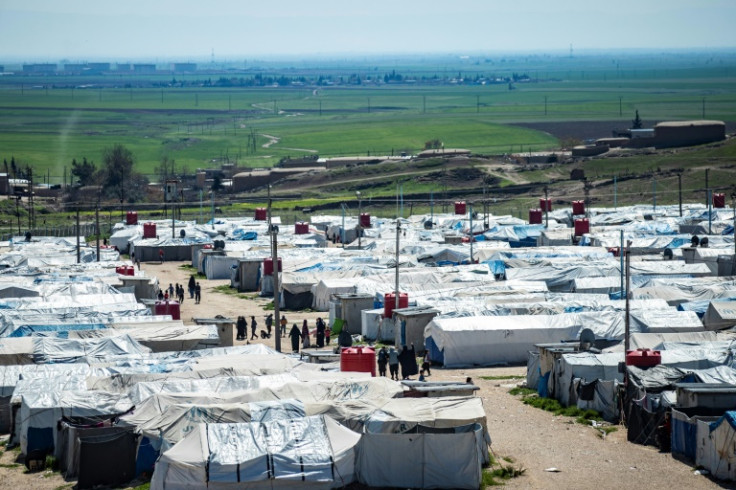Two Repatriated IS Wives Jailed On Arrival Back In Spain

A Madrid court ordered two Spanish women who married Islamic State (IS) fighters remanded in custody Wednesday on terror-related charges after they were flown back from Syrian detention camps with 13 children, legal documents showed.
They arrived at Torrejon de Ardoz military airbase near Madrid late Monday nearly two months after the Spanish government agreed to fly them home from the notorious Roj detention camp in Kurdish-controlled north-eastern Syria.
Detained on arrival, Yolanda Martinez Cobos and Luna Fernandez Grande were on Wednesday brought before a judge at the Audiencia National, Spain's top criminal court.
After hearing their statements, the judge ordered they be held in pre-trial detention without bail on charges of "joining a terror organisation" -- namely Daesh, which is the Arabic acronym for the Islamic State (IS) group.
In his ruling, he said there was "a concrete flight risk given the serious charges against them" as well as an "obvious" risk of reoffending.
But he did not suspend their parental rights given that they would be in prison, which meant there was "no potential risk of them continuing the possible indoctrination of their children".
Their children are currently in the care of Madrid's regional social services.
El Pais newspaper, which interviewed the pair and a third Spanish woman at another Syrian detention camp in 2019, said Martinez, now 37, had four children, while Fernandez, 34, had five.
The other four children were orphans with grandparents in Madrid who Fernandez had cared for in the camp. They too were now in the custody of social services.
In his ruling, the judge said the women and their husbands had been investigated back in 2014 for their involvement in the so-called Al Andalus Brigade. It was set up in Madrid to radicalise and recruit volunteers and help them reach Syria and Iraq to carry out attacks.
The pair "participated in activities supporting Daesh both before and after moving out to the Syrian-Iraqi conflict zone with their husbands in mid-2014," the judge said.
After they left, there was "no reliable information" about them until they appeared, alongside a third woman, in the El Pais video interview published in 2019.
Despite Yolanda Martinez's efforts to distance herself from membership of IS, her remarks in the interview -- in which she said they were given a house and her husband got a job in the IS courts -- told a different story.
"Her words gave her away because only members would be given a house and a job in the administration" of the IS caliphate, said the judge. The fact that she'd remained in the area "shows her and her husband's unwavering commitment to Daesh", he added.
Luna Fernandez, he said, had played "a key role among the women within the Al-Andalus Brigade". Her remarks in the same interview had demonstrated a "radical and extremist internalisation of Islam".
El Mundo newspaper said Fernandez was a widow but that Martinez's husband was in jail in Syria.
Spain had in November agreed to repatriate three women, but the third -- identified in the 2019 El Pais interview as Lubna Miludi from Spain's North African enclave of Ceuta -- could not be located.
The United Nations welcomed the women's repatriation from Roj camp. A spokesman described conditions in the Syrian detention camps as "almost inhuman and extremely challenging".
Over the past decade, thousands of extremists in Europe travelled to Syria to become IS fighters. They often took their wives and children to live in the "caliphate" it set up in territory seized in Iraq and Syria.
Since the caliphate fell in 2019, the return of family members of fighters either captured or killed has been a thorny issue for European countries.
Belgium, France, Germany and the Netherlands have also repatriated relatives of jihadist fighters.
© Copyright AFP 2024. All rights reserved.







